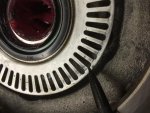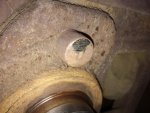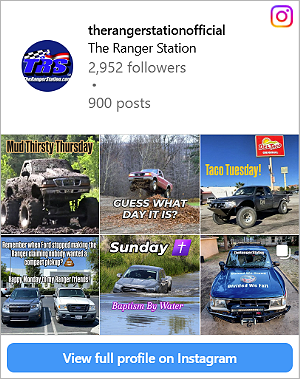augie
Member
- Joined
- Feb 21, 2016
- Messages
- 5
- Vehicle Year
- 2004
- Transmission
- Manual
Hello,
I have a 04 Mazda B2300 2 wheel drive that I just finished replacing the front brakes, rotor/hubs, and front wheel bearings on. I took it for a test drive and at about 45 MPH the steering wheel shakes slightly back and forth, and there's a vibration feeling that progressively gets worse as speed increases.
The details of the job:
I brought the old rotor/hubs (the hub is built into the rotor) to the parts store to have turned, and was told they were "non serviceable" so I bought brand new ones for about $50 each. They matched up the size of the rotors with my old ones since there is more than one size apparently. I bought new bearings\seals\pads\hardware kit\bearing grease there as well. I've never replaced a rotor that had the hub built into it, and these ones that I got from the parts store had new bearing races already pressed into them. I checked each rotor thoroughly to make sure they pressed the races all the way down and seated. When it came to installing the new bearings, I initially torqued the bearing nut to 25ft lbs, then backed it off a half-turn (basically making it loose again), then torquing the bearing nut to 20 inch lbs with a snap-on torque-o-meter I had from previous transmission work (it only goes up to 30 inch lbs.) The nut is pretty much on hand tight, but there's no play in the rotor, or the wheel once the wheel was mounted. The caliper guides were cleaned up and new guide seals put on them, with new caliper grease. They move freely, and I also payed close attention to which guide pin goes where in the caliper (there's a little black rubber thing on the end one of the guide pins for each side).
Taking the car for a test drive - the brakes feel great, and don't drag. The calipers aren't sticking at all. I used a dial indicator on a magnetic base to try measuring the runout on the rim of the front wheels to try and see if there's a wobble in the wheel due to the new rotor/hub that was put on or something that wasn't seating correctly. The measurements I got from the front matched the rear tires - so I don't think there's a wobble in the wheel.
I'm at a complete loss, and have no idea what could be causing the issue. I could return the rotor/hubs and get new ones from the parts store - but I guess I'm not convinced they're the problem yet... Maybe they are... There was a tiny bit of play in the rotor/hubs PRIOR to me replacing them. I'm wondering if replacing the parts on the truck has changed the geometry somehow of something... Although I've never seen this happen before.
Has anyone had problems like this? Does anyone have any suggestions to what I could check next? I'm thinking about taking the truck down to Les Schwab and seeing if they can see where the problem is...
Thanks!
I have a 04 Mazda B2300 2 wheel drive that I just finished replacing the front brakes, rotor/hubs, and front wheel bearings on. I took it for a test drive and at about 45 MPH the steering wheel shakes slightly back and forth, and there's a vibration feeling that progressively gets worse as speed increases.
The details of the job:
I brought the old rotor/hubs (the hub is built into the rotor) to the parts store to have turned, and was told they were "non serviceable" so I bought brand new ones for about $50 each. They matched up the size of the rotors with my old ones since there is more than one size apparently. I bought new bearings\seals\pads\hardware kit\bearing grease there as well. I've never replaced a rotor that had the hub built into it, and these ones that I got from the parts store had new bearing races already pressed into them. I checked each rotor thoroughly to make sure they pressed the races all the way down and seated. When it came to installing the new bearings, I initially torqued the bearing nut to 25ft lbs, then backed it off a half-turn (basically making it loose again), then torquing the bearing nut to 20 inch lbs with a snap-on torque-o-meter I had from previous transmission work (it only goes up to 30 inch lbs.) The nut is pretty much on hand tight, but there's no play in the rotor, or the wheel once the wheel was mounted. The caliper guides were cleaned up and new guide seals put on them, with new caliper grease. They move freely, and I also payed close attention to which guide pin goes where in the caliper (there's a little black rubber thing on the end one of the guide pins for each side).
Taking the car for a test drive - the brakes feel great, and don't drag. The calipers aren't sticking at all. I used a dial indicator on a magnetic base to try measuring the runout on the rim of the front wheels to try and see if there's a wobble in the wheel due to the new rotor/hub that was put on or something that wasn't seating correctly. The measurements I got from the front matched the rear tires - so I don't think there's a wobble in the wheel.
I'm at a complete loss, and have no idea what could be causing the issue. I could return the rotor/hubs and get new ones from the parts store - but I guess I'm not convinced they're the problem yet... Maybe they are... There was a tiny bit of play in the rotor/hubs PRIOR to me replacing them. I'm wondering if replacing the parts on the truck has changed the geometry somehow of something... Although I've never seen this happen before.
Has anyone had problems like this? Does anyone have any suggestions to what I could check next? I'm thinking about taking the truck down to Les Schwab and seeing if they can see where the problem is...
Thanks!














